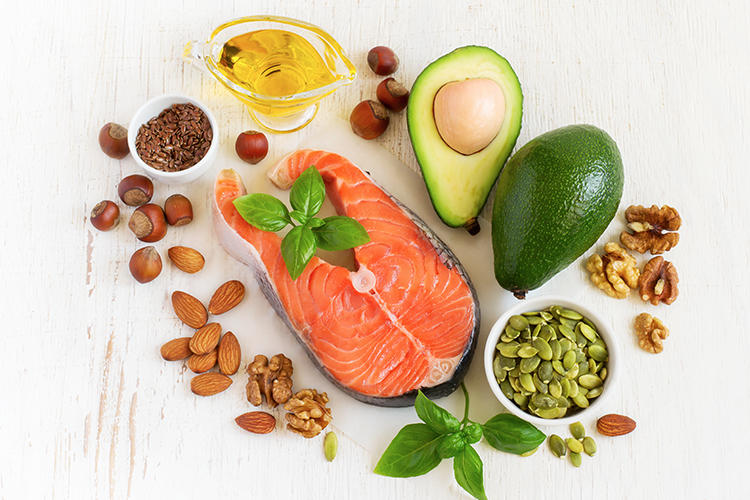Blog
Healthy fats for a longer life
 Good fats are so good, right? Tasty, rich and satisfying, and they help absorption of certain nutrients, boost brain function, maintain a healthy heart, are essential for hormone production, and may assist with weight loss and improving markers associated with type 2 diabetes.
Good fats are so good, right? Tasty, rich and satisfying, and they help absorption of certain nutrients, boost brain function, maintain a healthy heart, are essential for hormone production, and may assist with weight loss and improving markers associated with type 2 diabetes.
And enjoying a regular dollop of healthy fats may help us live longer, according to research out of Harvard T.H. Chan School of Public Health.
Researchers analysed dietary intake of 83,349 women and 42,884 men from two long-term epidemiological studies – the Nurses’ Health Study and Health Professionals Follow-up Study respectively – to assess any correlation between specific dietary fat intake – including monounsaturated, polyunsaturated, saturated and trans-fats – and all-cause mortality. They also looked into any correlation between dietary fat intake and death related to cardiovascular disease, neurodegenerative disease, cancer and respiratory disease.1
Old mate trans-fat came out looking bad. Researchers found a 16% higher chance of premature death was associated with every 2% increase in trans-fat intake. Though this is not surprising – that stuff is nasty! Whilst small concentrations of trans-fatty acids occur naturally in whole foods like butter and meat, the primary source in the human diet is from partially hydrogenated vegetable oils in processed food or heating oils to very high temperatures.
However, when comparing unsaturated fats intake with the same amount of energy from carbohydrates, it was found:
- Monounsaturated fats had 19% overall lower mortality.
- Polyunsaturated fats (that includes omega-6 and omega-3 essential fatty acids) had 11% overall lower mortality.
The results also favoured unsaturated fats over saturated fats, and found replacing all fats with carbohydrates was associated with higher mortality (not surprising considering a major source of carbohydrates in the American diet is the heavily refined and sugary stuff).
This study reflects a recent meta-analysis supporting benefits of a Mediterranean whole food style diet high in healthy fats for type 2 diabetes, CVD and breast cancer.
The Harvard study above includes liquid vegetable oils associated with the positive health outcomes. Whilst olive oil is great, we aren’t huge fans of the heavily processed industrial seed oils. Whilst it is also good to remember that liquid vegetable oils considered ‘healthy’ are likely eaten in context with a relatively ‘healthy’ diet, full of vegetables and fruit, these can provide an excess of omega-6 fatty acids, some of which can promote inflammation.2;3
Don’t get us wrong – we certainly need some omega-6 fats! Omega-6 and omega-3 fatty acids are an essential part of the human diet. But they should be consumed in balance with each other3 – we discuss that ratio here. If you are limiting your intake of heavily processed junk food and enjoying mostly real, whole foods including nuts, seeds, greens and a little oily fish, you are likely getting the essential fatty acid intake you need.
So what fats are the healthy fats we like?
Quality and type matters
It is important to note that it isn’t often one macronutrient that unleashes all good or bad impacts to health. Life is more complex.
It is more likely the dietary pattern as a whole. Hence why we at That Sugar constantly go on about eating real, whole foods – whether to boost energy, manage weight, or simply get that added sugar consumption down. But remember that the occasional treat is okay – we are all partial to a potato crisp or a slice of birthday cake!
So, if wanting to enjoy real, whole food fats as part of your real, whole food way of eating, consider these:
- Extra virgin olive oil – a great source of monounsaturated fats that has been minimally processed into an oil for your enjoyment. Olives themselves are great too!
- Avocado – nutrient dense, super creamy and offers a dose of fibre (THE nutrient our gut bugs love)
- Nuts and seeds – packed with good monounsaturated and polyunsaturated fats, protein and minerals, they can be added to any meal, or ground up into a delicious nut or seed spread!
- Oily fish – having a serve of sustainably caught fish a couple times a week and get a healthy dose of anti-inflammatory and brain supportive omega-3 fatty acids.
By Angela Johnson (BHSc Nut. Med.)
References:
- Wang, DD, Yanping, L, Chiuve, SE, Stampfer, MJ, Manson, JE, Rimm, EB, Willett, WC, Hu, FB, & Li, Y 2016, ‘Association of Specific Dietary Fats With Total and Cause-Specific Mortality’, JAMA Internal Medicine, vol. 176, no. 8, pp. 1134-1145.
- Univeristy of Maryland Medical Centre 2015, Omega-6 Fatty Acids, viewed 15 November 2016, <http://umm.edu/health/medical/altmed/supplement/omega6-fatty-acids>
- Hibbeln, JR, Nieminen, LG, Blasbalg, TL, Riggs, JA, & Lands, WM 2006, ‘Healthy intakes of n-3 and n-6 fatty acids: estimations considering worldwide diversity’, The American Journal Of Clinical Nutrition, vol. 83, no. 6 Suppl, pp. 1483S-1493S.











